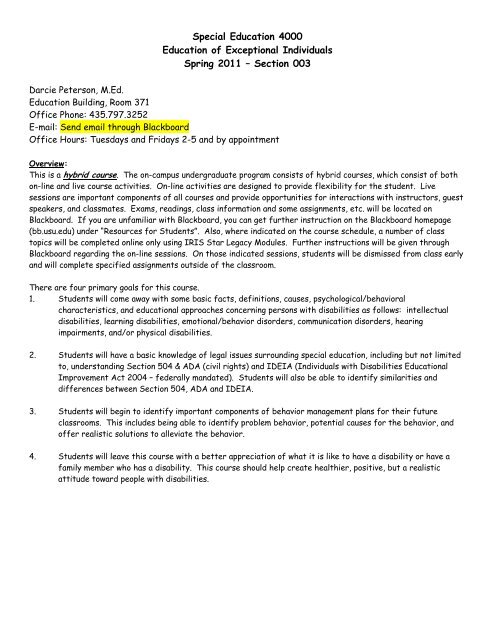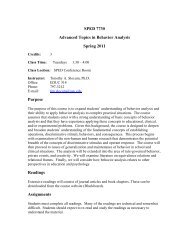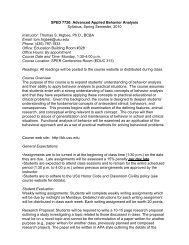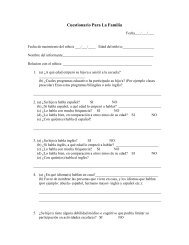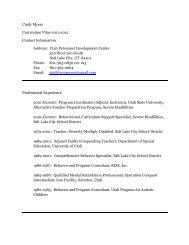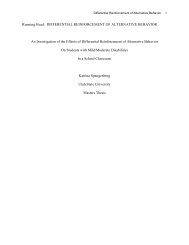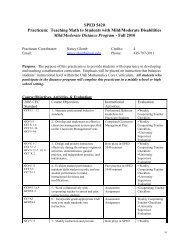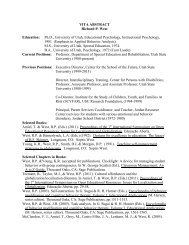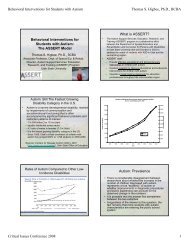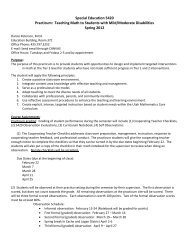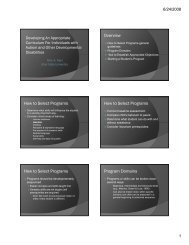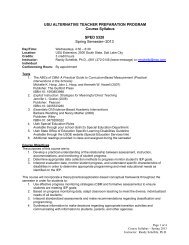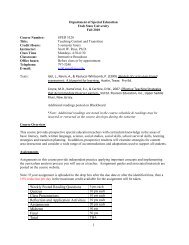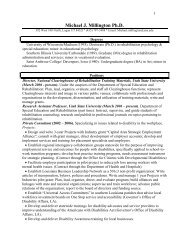SPED 4000 Syllabus and Schedule Spring 2011 Peterson - Special ...
SPED 4000 Syllabus and Schedule Spring 2011 Peterson - Special ...
SPED 4000 Syllabus and Schedule Spring 2011 Peterson - Special ...
You also want an ePaper? Increase the reach of your titles
YUMPU automatically turns print PDFs into web optimized ePapers that Google loves.
<strong>Special</strong> Education <strong>4000</strong><br />
Education of Exceptional Individuals<br />
<strong>Spring</strong> <strong>2011</strong> – Section 003<br />
Darcie <strong>Peterson</strong>, M.Ed.<br />
Education Building, Room 371<br />
Office Phone: 435.797.3252<br />
E-mail: Send email through Blackboard<br />
Office Hours: Tuesdays <strong>and</strong> Fridays 2-5 <strong>and</strong> by appointment<br />
Overview:<br />
This is a hybrid course. The on-campus undergraduate program consists of hybrid courses, which consist of both<br />
on-line <strong>and</strong> live course activities. On-line activities are designed to provide flexibility for the student. Live<br />
sessions are important components of all courses <strong>and</strong> provide opportunities for interactions with instructors, guest<br />
speakers, <strong>and</strong> classmates. Exams, readings, class information <strong>and</strong> some assignments, etc. will be located on<br />
Blackboard. If you are unfamiliar with Blackboard, you can get further instruction on the Blackboard homepage<br />
(bb.usu.edu) under “Resources for Students”. Also, where indicated on the course schedule, a number of class<br />
topics will be completed online only using IRIS Star Legacy Modules. Further instructions will be given through<br />
Blackboard regarding the on-line sessions. On those indicated sessions, students will be dismissed from class early<br />
<strong>and</strong> will complete specified assignments outside of the classroom.<br />
There are four primary goals for this course.<br />
1. Students will come away with some basic facts, definitions, causes, psychological/behavioral<br />
characteristics, <strong>and</strong> educational approaches concerning persons with disabilities as follows: intellectual<br />
disabilities, learning disabilities, emotional/behavior disorders, communication disorders, hearing<br />
impairments, <strong>and</strong>/or physical disabilities.<br />
2. Students will have a basic knowledge of legal issues surrounding special education, including but not limited<br />
to, underst<strong>and</strong>ing Section 504 & ADA (civil rights) <strong>and</strong> IDEIA (Individuals with Disabilities Educational<br />
Improvement Act 2004 – federally m<strong>and</strong>ated). Students will also be able to identify similarities <strong>and</strong><br />
differences between Section 504, ADA <strong>and</strong> IDEIA.<br />
3. Students will begin to identify important components of behavior management plans for their future<br />
classrooms. This includes being able to identify problem behavior, potential causes for the behavior, <strong>and</strong><br />
offer realistic solutions to alleviate the behavior.<br />
4. Students will leave this course with a better appreciation of what it is like to have a disability or have a<br />
family member who has a disability. This course should help create healthier, positive, but a realistic<br />
attitude toward people with disabilities.
Course Resource Materials<br />
You are required to read identified h<strong>and</strong>outs specified for each session for this course. Information<br />
from the h<strong>and</strong>outs will be found on the exams. Students have two options to obtain these required<br />
h<strong>and</strong>outs.<br />
1. READINGS IN COURSE READER: There is a course reader available to purchase through the USU bookstore<br />
for all <strong>SPED</strong> <strong>4000</strong> courses. This course reader contains all the required readings for this course.<br />
OR<br />
2. READINGS ON BLACKBOARD: The readings will also be available through Blackboard.<br />
It is your choice to purchase the reader or download the assigned material through Blackboard<br />
Course Assignments:<br />
Explanations <strong>and</strong> further instructions for each assignment can be found on Blackboard. Availability dates<br />
<strong>and</strong> due dates can be found on Blackboard for each assignment <strong>and</strong>/or on the course schedule. Assignments<br />
are due ½ hour before the beginning of class on the specified due date. NO assignments will be accepted<br />
once assignments are closed on Blackboard.<br />
1. Disability Law<br />
This is an in-class group assignment. It is worth 20 points. No makeup or alternative assignment<br />
will be given to students who miss this class.<br />
2. Disability Summaries<br />
For this assignment you will research professional journal articles, IRIS, etc. to locate information<br />
on three separate disabilities of your choosing. You will write a one-page summary of each disability<br />
that includes characteristics, teaching strategies, modifications, adaptations, accommodations, etc.<br />
The complete description of the assignment, resources <strong>and</strong> an example are located on the course<br />
content page under Week 6.<br />
3. Classroom activities<br />
There will be 10 unannounced activities throughout the semester. These activities may include<br />
guest lectures, videos, assessments, h<strong>and</strong>s-on activities, pop quizzes, etc. On the days activities are<br />
included, you will be asked to turn in specific paperwork or sign a roll giving you credit for<br />
participating in the activity. You will drop one activity (in case of illness, family activities, a<br />
wedding, missed alarm, etc.). You will NOT be able to make up any classroom activities.<br />
4. Journal Reflection: Assigned Readings<br />
You will be required to reflect on the assigned readings (h<strong>and</strong>outs). Refer to your course schedule<br />
to identify the week each entry is due. There are a few weeks where there is no entry required.<br />
Under the Course Content page, you will find the link to post your entry. Each entry will be worth 5<br />
points <strong>and</strong> you will NOT be able to drop any of your entries. A specific question for each entry will<br />
be provided. Your score will be a result of your thoroughness <strong>and</strong> thoughtfulness of your response.<br />
At a minimum, your response should be at least 250 words in length including both your answer to<br />
the question <strong>and</strong> your reflection. It might help if you write the response using a program like Word<br />
to measure length. Then you can copy <strong>and</strong> paste what you wrote into Blackboard. Please demonstrate<br />
an underst<strong>and</strong>ing of the reading. If you use small parts of the reading in your response, please<br />
paraphrase into your own words (changing one or two words in a sentence is not enough), or use<br />
quotation marks to reflect that you are using the words directly from the text.
When the journals are graded, the grader will first look to make sure that all parts of the question<br />
are answered correctly. So, if the question has multiple parts (like in Reflection Journal 5 -<br />
Families), between one <strong>and</strong> four points will be earned by answering each part of the question. The<br />
remaining points are earned by providing sufficient explanation <strong>and</strong> reflection about what you<br />
learned.<br />
Explanation <strong>and</strong> reflection means that you should provide your own personal viewpoint. You can talk<br />
about whether you agree or disagree with the information you read. You can talk about some<br />
possible fears or goals you have about using the knowledge you have gained. You can give very<br />
specific explanations about how a strategy will work in a particular situation in your future<br />
classroom (for example, describe how you personally would use visual demonstration to help a child<br />
learn to measure the length of a table - or whatever is appropriate for your students' age level <strong>and</strong><br />
subject). In the reflection part, the grader is looking for you to provide some thoughts beyond<br />
what you read in the h<strong>and</strong>outs.<br />
5. <strong>Syllabus</strong> Quiz: See schedule for quiz date<br />
There is one quiz at the beginning of the semester. The information on the quiz will cover<br />
classroom <strong>and</strong> syllabus information.<br />
6. Exams: Midterm <strong>and</strong> Final<br />
Each exam will have 50 questions <strong>and</strong> is worth 50 points. See schedule for exam date. Study<br />
guides are on the course content page within Blackboard.<br />
On-Line Sessions<br />
Each on-line session will be completed outside of the classroom. Typically class will be dismissed early on the days<br />
of the assigned modules. The time usually spent in class will be devoted to the completion of the module. Refer to<br />
the course schedule for more detail <strong>and</strong> dates.<br />
1. IRIS: Cultural <strong>and</strong> Linguistic Differences – NO CLASS – ASSIGNMENT DUE DAY AFTER HOLIDAY<br />
2. IRIS: Collaborating with Families – CLASS DISMISSED EARLY<br />
3. IRIS: Response to Intervention (RTI Part 1) – CLASS DISMISSED EARLY<br />
4. IRIS: Addressing Disruptive <strong>and</strong> Noncompliant Behavior (Part 1) - CLASS DISMISSED EARLY<br />
5. IRIS: Instructional Accommodations for Students with Visual Disabilities - CLASS DISMISSED<br />
EARLY
Student Evaluation:<br />
Students will be able to earn up to 440 points for the course, as follows:<br />
<strong>Syllabus</strong> Quiz<br />
10 points<br />
Disability Law<br />
20 points<br />
Disability Summaries 60 points (3 @ 20 points each)<br />
IRIS Assignments 100 points (5 @ 20 points each)<br />
Class activities 90 points (10 activities @ 10 points each; drop one activity)<br />
Reflection Journal 60 points (12@5 points each)<br />
Midterm Exam<br />
50 points<br />
Final exam<br />
50 points<br />
Percentage<br />
Grade<br />
94 - 100 A<br />
90 – 93.99 A-<br />
87 – 89.99 B+<br />
83 – 86.99 B<br />
80 – 82.99 B-<br />
77 – 79.99 C+<br />
Percentage<br />
Grade<br />
73 – 76.99 C<br />
70 – 72.99 C-<br />
65 – 69.99 D+<br />
60 – 64.99 D<br />
Below 60<br />
F<br />
Note: Students earn the grade they receive. The instructor will not change any grades any time during or after<br />
the semester.<br />
The instructor reserves the right to modify this syllabus or schedule to accommodate student needs, guest<br />
speakers, lectures, information presented, etc.<br />
Students with Disabilities: Students with physical, sensory, emotional or medical impairments may be eligible for<br />
reasonable accommodations in accordance with the Americans with Disabilities Act <strong>and</strong> Section 504 of the<br />
Rehabilitation Act of 1973. All accommodations are coordinated through the Disability Resource Center (DRC) in<br />
Room 101 of the University Inn, 797-2444 voice, 797-0740 TTY, or toll free at 1-800-259-2966. Please contact<br />
the DRC as early in the semester as possible. Alternate format materials (Braille, large print or digital) are<br />
available with advance notice. Please contact the instructor during the first week of class to arrange such<br />
accommodations. The instructor must have the appropriate forms from the DRC in order to address any<br />
accommodations.<br />
Student Code: Students need to adhere to student code by not interfering with the instruction or the learning of<br />
other students. The instructor encourages each student to actively participate in class discussions.<br />
Participation is defined as occasional verbal contributions to class discussion/activity that extend <strong>and</strong><br />
enhance the group process. Participation is NOT defined as merely attending class.<br />
Courteous demeanor is defined as (1) arriving on time, (2) leaving at the scheduled time <strong>and</strong> not before<br />
(unless the instructor is notified <strong>and</strong> has approved the request), (3) listening (not talking) during the<br />
lecture or class discussion, <strong>and</strong> (4) refraining from the use of cell phones (including texting), internet<br />
surfing, <strong>and</strong> unrelated reading. If unrelated computer use becomes excessive in class, laptops may be<br />
banned.<br />
If this becomes a problem by interfering with the instruction of the instructor <strong>and</strong> interrupting the<br />
learning <strong>and</strong> listening of other students, you may be asked to leave the class.<br />
Student Responsibilities<br />
As members of the academic community at Utah State University, students share responsibility for its growth <strong>and</strong><br />
continued well-being <strong>and</strong> for maintaining an environment which encourages free inquiry <strong>and</strong> expression. Students<br />
are expected to engage in reasonable <strong>and</strong> substantial preparation for their coursework, to follow course <strong>and</strong> class
guidelines as set forth in syllabi <strong>and</strong> as annunciated by their instructors, <strong>and</strong> to complete all academic exercises<br />
with integrity. All interactions with faculty members, staff members, <strong>and</strong> other students shall be conducted with<br />
courtesy, civility, decency <strong>and</strong> a concern for personal dignity. These responsibilities are the foundation of the<br />
University’s St<strong>and</strong>ards of Conduct (Honor System – see section V-3, Misconduct – see section V-3).<br />
Academic Honesty<br />
Please read through USU Honor System Guidelines on the Course Content page under Introduction & Policies. Be<br />
aware that I use the following definitions. According to the Merriam-Webster Online Dictionary, to "plagiarize"<br />
means<br />
1) to steal <strong>and</strong> pass off (the ideas or words of another) as one's own<br />
2) to use (another's production) without crediting the source<br />
3) to commit literary theft<br />
4) to present as new <strong>and</strong> original an idea or product derived from an existing source.<br />
In other words, plagiarism is an act of fraud. It involves both stealing someone else's work <strong>and</strong> lying about it<br />
afterward.<br />
Group work has become an issue in classes. In past classes there have been situations in which group work could<br />
have been considered cheating or plagiarism. “Legitimate” group work is defined as that which takes advantage of<br />
consultation with your peers, providing you with ideas, suggestions, corrections, etc., which you take into<br />
consideration in the development of your unique <strong>and</strong> individual product. Reading the text <strong>and</strong> writing answers to the<br />
study guide items, then working closely with other students, comparing study guide answers, <strong>and</strong> attempting to<br />
resolve different underst<strong>and</strong>ings is an excellent learning technique <strong>and</strong> is strongly encouraged.<br />
Failing to do the reading <strong>and</strong> memorizing answers that another student has written for the study guide is not<br />
legitimate group work; it is cheating. Drafting the assignments, then comparing specific aspects of your product to<br />
others’ <strong>and</strong> discussing teaching situations <strong>and</strong> <strong>SPED</strong> issues is legitimate <strong>and</strong> encouraged. Copying someone else’s<br />
quizzes, assignment, or articles is not legitimate; it is cheating. Completing the assignments as a group project is<br />
not legitimate; it is cheating. You must make your own decisions about every detail or your assignment.<br />
Always, if you are unsure about boundaries of legitimate group work, please (1) ask for clarification from the<br />
instructor, <strong>and</strong> (2) make full disclosure so that there is no question about your intentions. I am very happy to talk<br />
about these boundaries <strong>and</strong> work with you to maximize your learning <strong>and</strong> maintain individual accountability.
<strong>Special</strong> Education <strong>4000</strong> <strong>Schedule</strong><br />
Darcie <strong>Peterson</strong>, M.Ed.<br />
<strong>Spring</strong> <strong>2011</strong><br />
(all quizzes/assignments open up after class<br />
<strong>and</strong> will close at 2:00 PM on the following Monday)<br />
Week Date Topic H<strong>and</strong>out (H)<br />
Week<br />
1<br />
Week<br />
2<br />
Week<br />
3<br />
1/10 • Introduction<br />
• <strong>Special</strong> Education Overview<br />
1/17 • No class – Holiday<br />
• IRIS: Cultural <strong>and</strong> Linguistic<br />
Differences (out of class<br />
assignment)<br />
1/24 • IDEIA<br />
• Section 504 <strong>and</strong> ADA<br />
Additional Resources<br />
(AR)<br />
Due<br />
H1-H3<br />
H4<br />
H5-H12<br />
Assignments & Due Dates<br />
(2:00 PM on Mondays)<br />
Reflection Journal 1: Person<br />
First Language<br />
IRIS: Cultural <strong>and</strong> Linguistic<br />
Differences<br />
Due Tues 1/18 at 2PM<br />
because of the holiday<br />
Reflection Journal 2: IDEIA<br />
<strong>Syllabus</strong> Quiz<br />
Week<br />
4<br />
1/31 • Inclusion<br />
• <strong>Special</strong> Education Process<br />
• Individualized Education Plan<br />
(IEP)<br />
Info Brief:<br />
Including<br />
Students<br />
H8, H9, H39<br />
Reflection Journal 3: Section<br />
504<br />
Note: Info Brief is NOT in course reader. It<br />
is located in materials under Week 4.<br />
Week<br />
5<br />
2/7 • Disability Law<br />
• IRIS: Collaborating with<br />
Families<br />
•<br />
Reflection Journal 4: Inclusion<br />
Disability Law (in class<br />
assignment only – no make ups)<br />
Week<br />
6<br />
2/14 • Learning Disabilities A<br />
• Disability Summaries<br />
Assignment discussed in<br />
class<br />
H13<br />
Reflection Journal 5: Families<br />
IRIS: Collaborating with<br />
Families<br />
Week<br />
7<br />
2/22<br />
Tuesday<br />
• Learning Disabilities B<br />
• IRIS: Response to<br />
Instruction Part 1<br />
Reflection Journal 6: Learning<br />
Disabilities<br />
Week<br />
8<br />
2/28 • Mental Retardation<br />
• School Wide Positive<br />
Behavior Support<br />
H14, H15,<br />
H21<br />
IRIS: RTI<br />
Week<br />
9<br />
3/14 • Emotional/Behavior<br />
Disorders<br />
• Classroom Management<br />
Strategies<br />
H20<br />
Reflection Journal 7: Mental<br />
Retardation
Week<br />
10<br />
Week<br />
11<br />
Week<br />
12<br />
Week<br />
13<br />
Week<br />
14<br />
Week<br />
15<br />
3/21 • Midterm (covers material in<br />
weeks 1-8)<br />
• IRIS: Addressing Disruptive<br />
Behaviors (class dismissed<br />
early)<br />
• Extra Credit Available<br />
3/28 • Autism<br />
• Communication Disorders<br />
Midterm<br />
Study Guide<br />
(on course<br />
content page)<br />
Reflection Journal 8:<br />
Emotional/Behavior Disorders<br />
H22, H27 IRIS: Addressing Disruptive<br />
Behaviors<br />
4/4 • ADHD H16-H19 Reflection Journal 9: Autism<br />
4/11 • Low Incidence Disabilities,<br />
Physical Disabilities, Health<br />
Impairments<br />
4/18 • Deafness/Hearing Loss<br />
• IRIS: Instructional<br />
Accommodations for<br />
Students with Visual<br />
Disabilities (class dismissed<br />
early)<br />
4/25 • Transition<br />
• Assistive Technology<br />
• Final Review<br />
H28-H39<br />
H23-H26<br />
H40-H41<br />
Final Study<br />
Guide<br />
(on course<br />
content page)<br />
Reflection Journal 10: ADHD<br />
Disability Summaries Due at<br />
beginning of class (2:30 PM)<br />
Reflection Journal 11: Low<br />
Incidence Disabilities<br />
Reflection Journal 12:<br />
Visual/Hearing Impairments<br />
IRIS: Instructional<br />
Accommodations<br />
Final 5/4<br />
Wed<br />
Final Exam (covers information from weeks 9-15)<br />
1:30<br />
Extra Credit Due<br />
CEC St<strong>and</strong>ards: CEC st<strong>and</strong>ards in <strong>Special</strong> Education are equivalent to INTASC St<strong>and</strong>ards. We use these<br />
st<strong>and</strong>ards as a reference to this course.<br />
CECSt<strong>and</strong>ard Description Learning Activities Evaluation<br />
CC1K7<br />
Family systems <strong>and</strong> the role of families in Reading text<br />
Quiz//exam<br />
the education process.<br />
Lecture/discussion<br />
CC1K8<br />
Historical points of view <strong>and</strong> contribution<br />
of culturally diverse groups.<br />
Reading text<br />
Lecture/discussion<br />
Quiz//exam<br />
CC1K10<br />
CC1K5<br />
CC1K6<br />
Potential impact of differences in values,<br />
languages, <strong>and</strong> customs that can exist<br />
between the home <strong>and</strong> school.<br />
Issues in definition <strong>and</strong> identification of<br />
individuals with exceptional learning<br />
needs, including those from culturally<br />
<strong>and</strong> linguistically diverse backgrounds.<br />
Issues, assurances <strong>and</strong> due process rights<br />
related assessment, eligibility, <strong>and</strong><br />
placement within a continuum of<br />
services.<br />
Reading text<br />
Lecture/discussion<br />
Activity<br />
Reading text<br />
Lecture/discussion<br />
Reading text<br />
Lecture/discussion<br />
Activity<br />
Quiz, exams,<br />
<strong>and</strong> assignment<br />
Quiz, exams,<br />
<strong>and</strong> assignment<br />
Quiz//exam
CC1K4<br />
CC1K3<br />
Rights <strong>and</strong> responsibilities of students,<br />
parents, teachers, <strong>and</strong> other<br />
professionals, <strong>and</strong> schools related to<br />
exceptional learning needs.<br />
Relationship of special education to the<br />
organization <strong>and</strong> function of educational<br />
agencies<br />
Reading text<br />
Lecture/discussion<br />
Reading text<br />
Lecture/discussion<br />
Quiz, exams,<br />
<strong>and</strong> assignment<br />
Quiz//exam<br />
CC2K2<br />
CC2K4<br />
CC2K5<br />
CC2K6<br />
CC3K1<br />
CC3K5<br />
CC5K2<br />
CC5K3<br />
Educational implications of<br />
characteristics of various exceptionalities<br />
Family systems <strong>and</strong> the role of families in<br />
supporting development.<br />
Similarities <strong>and</strong> differences of individuals<br />
with <strong>and</strong> without exceptional leaning<br />
needs.<br />
Similarities <strong>and</strong> differences among<br />
individuals with exceptional learning<br />
needs.<br />
Effects an exceptional condition(s) can<br />
have on an individual’s life.<br />
Differing ways of learning of individuals<br />
with exceptional learning needs including<br />
those from culturally diverse<br />
backgrounds <strong>and</strong> strategies addressing<br />
these differences<br />
Basic classroom management theories<br />
<strong>and</strong> strategies for individual with<br />
exceptional learning needs.<br />
Effective management of teaching <strong>and</strong><br />
learning<br />
Reading text<br />
Lecture/discussion<br />
Reading text<br />
Lecture/discussion<br />
Reading text<br />
Lecture/discussion<br />
Activity<br />
Reading text<br />
Lecture/discussion<br />
Reading text<br />
Lecture/discussion<br />
Reading text<br />
Lecture/discussion<br />
Reading text<br />
Lecture/discussion<br />
Reading text<br />
Lecture/discussion<br />
Activity<br />
Reading text<br />
Lecture/discussion<br />
CC6K4<br />
Augmentative <strong>and</strong> assistive<br />
communication strategies.<br />
CC7S5 Use task analysis. Reading text<br />
Lecture/discussion<br />
Activity<br />
Quiz, exams,<br />
<strong>and</strong> assignment<br />
Quiz//exam<br />
Quiz, exams,<br />
<strong>and</strong> assignment<br />
Quiz, exams,<br />
<strong>and</strong> assignment<br />
Quiz//exam<br />
Quiz//exam<br />
Quiz, exams,<br />
<strong>and</strong> assignment<br />
Quiz//exam<br />
Quiz//exam<br />
Activity<br />
CC8K2<br />
Legal provisions <strong>and</strong> ethical principles Reading text<br />
Quiz//exam<br />
regarding assessment of individuals. Lecture/discussion<br />
CC8K3<br />
Screening, pre‐referral, referral, <strong>and</strong><br />
classification procedures.<br />
Reading text<br />
Lecture/discussion<br />
Quiz, exams,<br />
<strong>and</strong> assignment<br />
CC9S10 Access information on exceptionalities. Lecture/discussion Assignment<br />
GC1K1/IC1K1 Definitions <strong>and</strong> issues related to the Reading text<br />
Quiz//exam<br />
identification of individuals with<br />
disabilities.<br />
Lecture/discussion<br />
GC1K5/IC1K4 Continuum of placement <strong>and</strong> services<br />
available for individuals with disabilities.<br />
Reading text<br />
Lecture/discussion<br />
Quiz//exam<br />
GC1K7<br />
GC1K8/IC1K6<br />
Factors that influence the overrepresentation<br />
of culturally/linguistically<br />
diverse students in programs for<br />
individuals with disabilities.<br />
Principles of normalization <strong>and</strong> concept<br />
of least restrictive environment.<br />
Reading text<br />
Lecture/discussion<br />
Reading text<br />
Lecture/discussion<br />
Quiz//exam<br />
Quiz//exam
GC2K2/IC2K2<br />
GC2K3/IC2K3<br />
GC2K5<br />
GC3K1/IC3K2<br />
CC4S4<br />
IC4K1<br />
GC4S7/IC4S2<br />
CC5K4<br />
CC5K6<br />
CC5S5<br />
CC5S10<br />
GC6K2/IC6K2<br />
CC10K2<br />
Impact of sensory impairments, physical<br />
<strong>and</strong> health disabilities on individuals,<br />
families, <strong>and</strong> society.<br />
Etiologies <strong>and</strong> medical aspects of<br />
conditions affecting individuals with<br />
disabilities.<br />
Common etiologies <strong>and</strong> the impact of<br />
sensory disabilities on learning <strong>and</strong><br />
experience.<br />
Impact of disabilities on auditory <strong>and</strong><br />
information processing skills.<br />
Use strategies to facilitate maintenance<br />
<strong>and</strong> generalization of skills across<br />
learning environments.<br />
<strong>Special</strong>ized materials for individuals with<br />
disabilities.<br />
Use appropriate adaptations <strong>and</strong><br />
technology for all individuals with<br />
disabilities.<br />
Teacher attitudes <strong>and</strong> behaviors that<br />
influence behavior of individuals with<br />
exceptional learning needs.<br />
Strategies for crisis prevention <strong>and</strong><br />
intervention.<br />
Modify the learning environment to<br />
manage behaviors.<br />
Use effective <strong>and</strong> varied behavior<br />
management strategies.<br />
Communication <strong>and</strong> social interaction<br />
alternatives for individuals who are<br />
nonspeaking.<br />
Roles of individuals with exceptional<br />
learning needs, families, <strong>and</strong> school <strong>and</strong><br />
community personnel in planning of an<br />
individualized program.<br />
Reading text<br />
Lecture/discussion<br />
Reading text<br />
Lecture/discussion<br />
Reading text<br />
Lecture/discussion<br />
Reading text<br />
Lecture/discussion<br />
Reading text<br />
Lecture/discussion<br />
Reading text<br />
Lecture/discussion<br />
Reading text<br />
Lecture/discussion<br />
Reading text<br />
Lecture/discussion<br />
Online Instructional<br />
module<br />
Reading text<br />
Lecture/discussion<br />
Lecture/discussion<br />
Online Instructional<br />
Module<br />
Reading Text<br />
Guest Lecturer<br />
Reading text<br />
Lecture/discussion<br />
Activity<br />
Quiz//exam<br />
Quiz, exams,<br />
<strong>and</strong> assignment<br />
Quiz, exams,<br />
<strong>and</strong> assignment<br />
Quiz//exam<br />
Quiz//exam<br />
Quiz, exams,<br />
<strong>and</strong> assignment<br />
Quiz//exam<br />
Quiz//exam<br />
Quiz//exam<br />
Quiz//exam<br />
Quiz//exam<br />
Quiz//exam<br />
Quiz//exam
USU AND DEPARTMENT OF SPECIAL EDUCATION<br />
AND REHABILITATION POLICIES<br />
USU INCOMPLETE POLICY<br />
Executive Memor<strong>and</strong>um 79-15<br />
A student who has been unable to complete the work of course assignments, examinations, or reports due to extenuating circumstances such as illness, death in the<br />
family, etc. - but not due to poor performance of his/her work - <strong>and</strong> who has completed most of the coursework, may petition the instructor of the course for time<br />
beyond the end of the quarter to finish the work. If the instructor agrees, the instructor will place two grades on the final grade list for the student, an "I" <strong>and</strong> a letter<br />
grade for the course computed as if the missing work were zero. The student is then required to complete the work in the manner <strong>and</strong> by the time agreed upon with the<br />
instructor, but, in any case, within 12 months of the end of the quarter in which the "I" was given. When the grade change is submitted by the instructor within the<br />
prescribed time, both the "I" <strong>and</strong> the grade submitted with the "I" will be removed from the student's record, the new grade placed on the record, <strong>and</strong> the GPA adjusted<br />
accordingly. If no change of grade is submitted by the instructor within the prescribed period, the "I" will be removed <strong>and</strong> the grade submitted with the "I" will remain<br />
as the permanent grade for the course. Research <strong>and</strong> thesis courses taken for graduate work are exempted from this policy.<br />
STUDENTS WITH DISABILITIES<br />
If a student has a disability that will likely require some accommodation by the instructor, the student must contact the instructor <strong>and</strong> document the disability through<br />
the Disability Resource Center, preferably during the first week of the course. Any requests for special considerations relating to attendance, pedagogy, taking of<br />
examinations, etc. must be discussed with <strong>and</strong> approved by the instructor. In cooperation with the Disability Resource Center, course materials can be provided in<br />
alternative formats--large print, audio, diskette or Braille. If you have additional questions or concerns, please contact the head of the Department of <strong>Special</strong> Education<br />
<strong>and</strong> Rehabilitation.<br />
DEPARTMENT POLICIES<br />
GRADING GUIDELINES<br />
1. Criteria for the awarding of each letter grade should be specified in the course syllabi for all courses.<br />
2. Grades given in all courses should truly reflect differences in student performance, not just meeting minimum criteria.<br />
GRADE POINT REQUIREMENTS<br />
1. Certification/Undergraduate Students - Students must maintain a grade point average of 2.75 after being admitted to the Teacher Education Program <strong>and</strong> while<br />
taking courses in the major.<br />
2. Graduate Students - All graduate students must maintain a 3.0 grade point average to remain an active student in the graduate program.<br />
STUDENT BEHAVIOR & ACADEMIC HONESTY<br />
Student behavior in accordance with USU’s Student Code of Conduct/Rights is expected during all interactions with faculty <strong>and</strong> peers. It is expected that students’ work<br />
will conform to the highest st<strong>and</strong>ards of academic honesty. Incidences of academic dishonesty (e.g., cheating on tests, plagiarism, lying to supervisors <strong>and</strong> cooperating<br />
teachers) will be referred to program committees for disciplinary action.<br />
CERTIFICATION/UNDERGRADUATE COURSE REQUIREMENTS<br />
1. Students are required to earn a "C" or higher in all certification courses. Students who receive a grade below "C" must retake the course. Each student will be<br />
allowed to repeat a maximum of one course (course is defined as didactic courses, practica <strong>and</strong> student teaching). Students who receive two grades below “C” or<br />
withdraw from two practica (or one practica two times) will not be permitted to continue coursework in special education. Student teaching may not be repeated<br />
without appeal <strong>and</strong> approval by the appropriate special education program committee.<br />
2. Students who do not apply for certification within 12 months of graduating, may be subject to additional coursework prior to recommending certification.<br />
BACKGROUND CHECK<br />
As a result of a legislative m<strong>and</strong>ate, all students planning on obtaining a teaching certificate in Utah must receive a background check completed prior to their student<br />
teaching experience. To expedite this process, all students planning on student teaching must submit completed background check forms to the Office of Teacher<br />
Certification, Education Building, Room 103. The forms are available in Room 103.


